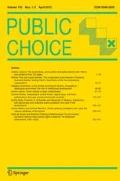Abstract
This paper models balanced-budget redistribution between socio-economic groups as the outcome of electoral competition between two political parties. Equilibrium is unique in the present model, and a sufficient condition for existence is given, requiring that there be enough ‘stochastic heterogeneity’ with respect to party preferences in the electorate. The validity of Hotelling's ‘principle of minimum differentiation’, and of ‘Director's Law’, are examined under alternative hypotheses concerning administrative costs of redistributions, and voter's possibilities both of abstaining from voting and of becoming campaign activists for one of the parties. The policy strategy of expected-plurality maximization is contrasted with the strategy of maximizing the probability of gaining a plurality. Incomes are fixed and known, so lump-sum taxation is feasible. However, constraints on tax/transfer differentiation between individuals are permitted in the analysis.
Similar content being viewed by others
References
Aranson, P.H., Hinich, M.J., and Ordeshook, P.C. (1974). Election goals and strategies, equivalent and non-equivalent candidate objectives. American Political Science Review, pp. 135–152.
d'Aspremont, C., Jaskold Gabszevicz, J., and Thisse, J.-F. (1979). On hotelling's ‘stability in competition’. Econometrica 47: 1145–1150.
Coughlin, P. (1982). Pareto optimality of policy proposals with probabilistic voting. Public Choice 39: 427–433.
Coughlin, P., and Nitzan, S. (1981). Electoral outcomes with probabilistic voting and Nash social welfare maxima. Journal of Public Economics 15: 113–121.
Cramer, H. (1946). Mathematical methods of Statistics. Princeton: Princeton University Press.
Davis, O.A., Hinich, M.J., and Ordeshook, P.C. (1970). An expository development of a mathematical model of the electoral process. American Political Science Review 64: 426–448.
Debreu, G., and Koopmans, T.C. (1980). Additively decomposed quasi-convex functions. Working paper in economic theory and econometrics No. IP-295. University of California, Berkeley.
Denzau, A.T., and Kats, A. (1977). Expected plurality voting equilibrium and social choice functions Review of Economic Studies (February): 227–233.
Downs, A. (1957). An economic theory of democracy. New York: Harper and Brothers.
Enelow, J.M., and Hinich, M.J. (1982). Nonspatial candidate characteristics and electoral competition. Journal of Politics 44: 115–130.
Hinich, M.J. (1984). Policy formation in a representative democracy. University of Texas at Austin. Unpublished.
Hinich, M.J., Ledyard, J.O., and Ordeshook, P.C. (1972). Nonvoting and the existence of equilibrium under majority vote. Journal of Economic Theory 4: 144–153.
Hirschman, A. (1970). Exit, voice and loyality. Cambridge, MA: Harvard University Press.
Hotelling, H. (1929). Stability in competition. Journal of Political Economy 39: 137–175.
Kramer, G.H. (1977). A dynamical model of political equilibrium. Journal of Economic Theory 16: 310–334.
Kramer, G.H. (1978). Existence of electoral equilibrium. In P.C. Ordeshook (Ed.), Game theory and political science. New York: New York University Press.
Kramer, G.H. (1983). Electoral competition in the zero-sum society. California Institute of Technology. Unpublished.
Lindbeck, A. (1985). Redistribution policy and the expansion of the public sector. Journal of Public Economics, forthcoming.
Lindbeck, A., and Weibull, J.W. (1985). Balanced-budget redistribution as political equilibrium. Institute for International Economic Studies, Stockholm University, Seminar Paper No. 341.
Lindberg, P.O. (1980). On r-convex functions. TRITA-MAT-1980–24, Department of Mathematics, Royal Institute of Technology, Stockholm.
McFadden, D. (1973). Conditional logit analysis of qualitative choice behavior. In P. Zarembka (Ed.). Frontiers in econometrics. New York: Academic Press.
Owen, G. (1982), Game Theory, Academic Press, New York.
de Palma, A., Ginsburgh, V., Papageorgiou, Y.Y., and Thisse, J.-F. (1985). The principle of minimum differentiation holds under uncertainty. Econometrica 53: 767–781.
Riker, W.H., and Ordeshook, P.C. (1968). A theory of the calculus of voting, American Political Science Review 62: 25–42.
Rosen, J.B. (1965). Existence and uniqueness of equilibrium points for concave n-person games. Econometrica 33: 520–534.
Schumpeter, J. (1950). Capitalism, socialism, and democracy. New York: Harper & Brothers.
Small, K.A., and Rosen, H.S. (1981). Applied welfare economics with discrete choice models. Econometrica 49: 105–130.
Stigler, G.J. (1970). Director's law of public income redistribution. Journal of Law and Economics 13: 1–10.
Wittman, D. (1983). Candidate motivation: A synthesis of alternative theories. American Political Science Review 77: 142–157.
Author information
Authors and Affiliations
Additional information
The authors are grateful for comments on an earlier version of the paper (Lindbeck and Weibull, 1985) from Nils Gottfries, Richard Jackman, Bo Larsson, Lars-Göran Mattson, Torsten Persson, Agnar Sandmo, Lars-Gunnar Svensson and from the participants in seminars at the Institute for International Economic Studies and at Lund University.
Rights and permissions
About this article
Cite this article
Lindbeck, A., Weibull, J.W. Balanced-budget redistribution as the outcome of political competition. Public Choice 52, 273–297 (1987). https://doi.org/10.1007/BF00116710
Issue Date:
DOI: https://doi.org/10.1007/BF00116710



